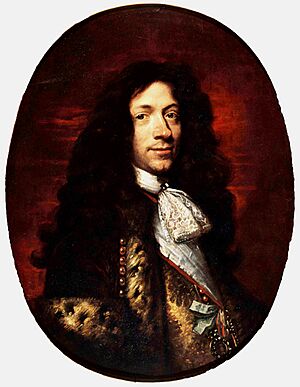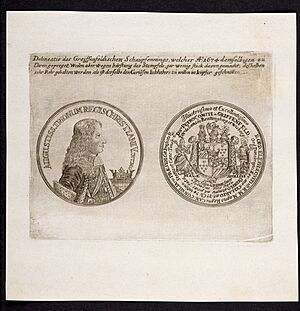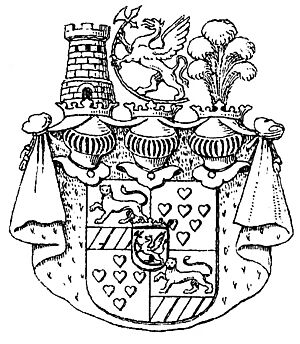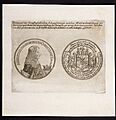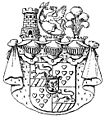Peder Griffenfeld facts for kids
Count Peder Griffenfeld (born Peder Schumacher) was an important Danish statesman and a close friend of the king. He was born on August 24, 1635, and passed away on March 12, 1699. From 1670, he became the main advisor to King Christian V of Denmark. He was so influential that he practically ran the countries of Denmark-Norway in the early 1670s. In 1673, he was made the Chancellor of Denmark, which was a very high position. He also became a count, the highest noble rank, and received the Order of the Elephant, Denmark's top award. Later, his enemies at court had him arrested in 1676. He was accused of serious crimes, which many historians believe were untrue. He was held in prison for 22 years, mostly at Munkholmen in Norway.
Contents
Growing Up and Learning
Peder Schumacher was born in Copenhagen, Denmark. His family was wealthy and involved in trade. They knew many important people in the city, like leaders, church officials, and scholars. Peder started preparing for university at just ten years old with a teacher named Jens Vorde. His teacher said Peder was incredibly talented, knew many classical languages, and worked very hard.
Peder's amazing skills during his first exams impressed Bishop Jesper Brochmand. The Bishop became his friend and introduced him to King Frederick III of Denmark. The king was very impressed with Peder. The Bishop even had Peder translate a chapter from a Hebrew Bible into Latin and then into Danish for the king's entertainment.
Travels and New Ideas
In 1654, young Peder traveled abroad for eight years to finish his education. He visited Germany, the Netherlands (staying in Leiden, Utrecht, and Amsterdam), and then went to Queen's College, Oxford in England for three years. While in England, he was very interested in the big changes happening there.
These events, along with a major change in Denmark that allowed middle-class people to rise in society, convinced him that his future was in politics. In 1660, Peder visited Paris, France. He was very impressed by how well a strong, central government worked when led by an energetic king like Louis XIV of France. From then on, France became his role model for politics and manners. He also spent a year in Spain, learning the Castilian language and its literature very well.
Becoming a Royal Advisor
When Peder returned to Copenhagen in 1662, the king had become very powerful. The king was looking for talented people from the middle class to help him. Peder managed to get the support of Kristoffer Gabel, who was a close friend of the king. In 1663, Peder became the royal librarian. He also became good friends with the king's son, Count Ulric Frederick Gyldenløve, which helped his position.
In 1665, Peder got his first political job as the king's secretary. In the same year, he wrote the important King's Law (Lex Regia), which set out the rules for the Danish monarchy. He was now an important person at court, and his friendly nature made many people like him. His influence in political matters also began to grow.
Rising Through the Ranks
When King Frederick III of Denmark passed away on February 9, 1670, Peder Schumacher was the most trusted of all the king's advisors. He knew about the secret new throne made of walrus ivory and the new royal symbols, which he had hidden for the king. Frederick III had also given him a sealed package with the King's Law inside, to be given only to the next king.
On his deathbed, Frederick III told his son, Christian V of Denmark, to trust Peder. "Make him a great man, but do it slowly," the old king advised. Christian V was also very impressed by how much his father had trusted Peder. When Peder gave the King's Law to Christian V, the new king immediately made him his principal private secretary.
Peder's rise was very fast. In May 1670, he received important titles like "excellency" and "privy councillor." In July of the same year, he was made a noble and took the name Griffenfeld. His new name came from the gold griffin on his family's coat of arms. In November 1673, he became a count and a knight of the Order of the Elephant. Finally, he was made imperial chancellor. In just a few months, he was in charge of almost every part of the government. He had reached the peak of his power.
Griffenfeld's Influence
Peder Griffenfeld had impressed King Frederick III with his writing and clever ideas. He won over the fun-loving Christian V by making things easy for him. Griffenfeld would do the thinking and acting for the king, while making the king believe he was doing it himself.
Griffenfeld was also a great organizer and diplomat. He improved many parts of the government. He helped bring in new titles like count and baron in 1671. He also created the Order of the Dannebrog to reward loyal people. Griffenfeld believed that the king should have the most power, and he wanted to reduce the power of the old noble families. The new titles he created were given by the king, which helped the king gain more control.
He also worked to improve trade and industry. He brought back the board of trade and removed some harmful monopolies. He reformed how the government worked, making it more organized and efficient. He also clearly defined the jobs and salaries of various officials. Under his leadership, Denmark was able to use its resources better than ever before.
Foreign Policy
In his last three years in power, Griffenfeld focused on Denmark-Norway's foreign policy. He wanted Denmark to become a major power again. He planned to do this by carefully managing the country's resources. He also wanted to make alliances that would bring in money and not too many responsibilities. This kind of careful policy was difficult during a time of much tension in Europe.
His main goal was peace, especially with Sweden, Denmark-Norway's most dangerous neighbor. He also wanted strong finances, hoping to get money from France to spend on weapons. Most importantly, Denmark-Norway had to avoid making enemies with both France and Sweden at the same time. Griffenfeld hoped for an alliance between Denmark, France, and Sweden. If that wasn't possible, an alliance with France without Sweden would be the next best thing. An alliance between France and Sweden without Denmark was something he wanted to avoid at all costs.
If Griffenfeld's plans had worked, Denmark might have regained some of its old territories easily. However, his ideas were often ignored. Despite his protests, war was declared against Sweden in 1675. His later policies seemed unclear to many, and his many enemies, who disliked his proud manner, decided to bring him down.
Trial and Imprisonment
On March 11, 1676, Griffenfeld was arrested on the king's orders and taken to the citadel. His papers were searched for nearly six weeks, but nothing treasonous was found. However, his enemies found something in his private diary. He had carelessly written that King Christian V once spoke "like a child" during a conversation with a foreign ambassador.
On May 3, Griffenfeld was put on trial. Instead of the usual supreme court, he was tried by a special group of ten important people, none of whom liked him much. Griffenfeld was accused of serious wrongdoings. He had to defend himself under very difficult conditions. For 46 days before his trial, he was kept in a dark prison cell without lights, books, or writing materials. He was also not allowed to have a lawyer.
Despite these challenges, he defended himself very well. In the end, he was sentenced to a harsh punishment. However, one of the ten judges refused to sign the sentence and privately told the king it was unfair. Griffenfeld's main offense was taking bribes, which was not a crime that usually led to such a severe punishment. The charge of treason was not proven.
Griffenfeld's punishment was changed at the last moment. When he heard that his sentence was changed to lifelong imprisonment, he said that this pardon was harder than the original punishment. He even asked if he could serve the king as a common soldier for the rest of his life, but his request was denied.
For the next 22 years, Denmark-Norway's once-great statesman was a lonely prisoner. He was first held in the fortress of Copenhagen, Denmark, and then at Munkholmen in Trondheim Fjord, Norway, where he passed away. Griffenfeld had married Kitty Nansen, who brought him a large fortune. She died in 1672, after they had a daughter. Griffenfeld and his wife are both buried at Vær Kirke in Århus Diocese.
Griffenfeldsgade, a street in Nørrebro, Copenhagen, and Griffenfeld Island in Southeast Greenland, are named after him.
Images for kids
 | William M. Jackson |
 | Juan E. Gilbert |
 | Neil deGrasse Tyson |


